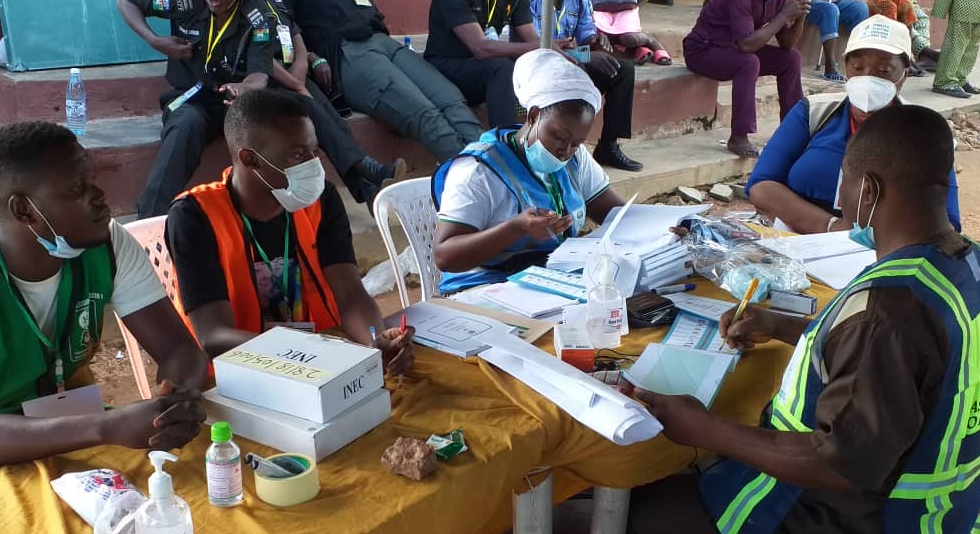The house of representatives, on Tuesday, constituted a seven-member conference committee on the electoral act amendment bill.
The development comes days after the senate set up a seven-member panel on the bill.
The committees are to harmonise the differences in the bill passed by the upper and lower legislative chambers.
The bill has been a subject of public debate and has divided lawmakers across party lines.
Advertisement
In July, both chambers passed the bill, but with different versions on the issue of electronic transmission of election results.
While the green chamber voted for the Independent National Electoral Commission (INEC) to transmit election results electronically, the red chamber empowered the Nigerian Communications Commission (NCC) to decide on e-transmission.
Several Nigerians, including civil society organisations (CSOs), have called on the national assembly to allow electronic transmission of results in the bill.
Advertisement
On Wednesday, former President Goodluck Jonathan supported the calls for e-transmission, adding that it will ensure transparency in the electoral process.
“Where there is no confidence in the electoral umpire, people resort to crisis. But unfortunately, sometimes, when the result comes out, the damage would have been done. I urge the national assembly, while looking at the law, they should allow the use of electronic means of transmitting results for the sake of transparency, as well as avoiding electoral crisis,” he said.
Now that the conference committees have been set up, checks by TheCable show that the chances of the national assembly empowering INEC to transmit election results electronically may be slim.
THE COMMITTEES
Advertisement
There are concerns that members of the conference committees set up by both chambers may work in line with party interests during the harmonisation process. If this happens, INEC may be denied the power to independently decide on e-transmission of election results.
A review of the lists of lawmakers by TheCable shows that the committees are dominated by members of the All Progressives Congress (APC).
Out of the seven members of the panel announced by Femi Gbajabiamila, speaker of the house of representatives, five are from the ruling party, while two are from the Peoples Democratic Party (PDP).
Members of the committee are Adeyemi Raphael Adaramodu (APC, Ekiti), Unyime Idem (PDP, Akwa Ibom), Ahmad Kalambiana (APC, Sokoto), Blessing Onu (APC, Benue), Emeka Azubogu (PDP, Anambra), Abiodun Faleke (APC, Lagos) and Aishatu Dukku (APC, Gombe).
Advertisement
At the upper legislative chamber, the committee is also dominated by members of the APC.
Members of the senate committee are Kabiru Gaya (APC, Kano), Ajibola Basiru (APC, Osun), Danjuma Goje (APC, Gombe), Uche Ekwunife (PDP, Anambra), Sani Musa (APC, Niger), Matthew Urhoghide (PDP, Edo), and Abdullahi Yahaya (APC, Kebbi).
Advertisement
THE CONTENTIOUS ISSUE
The most contentious issue in the electoral act amendment bill is section 52, which deals with e-transmission of election results — strongly recommended by INEC.
Advertisement
Section 52 (3) of the bill reads: “The commission may transmit results of elections by electronic means where and when practicable.”
But during the clause-by-clause consideration of the bill in July, Sabi Abdullahi, an APC lawmaker, had proposed that the section be amended to allow NCC to certify that national coverage is adequate and secure, while the national assembly must approve before INEC can transmit election results electronically.
Advertisement
This led to a rowdy session, and despite the concerns raised by those in the opposition, the senate retained Abdullahi’s amendment after a 52-28 vote.
Interestingly, all APC senators present voted in favour of the amendment — including the five lawmakers of the conference committee.
DOES INEC NEED NCC’S APPROVAL FOR E-TRANSMISSION OF RESULTS?
Earlier in September, INEC had said it does not need the approval of the NCC to transmit election results electronically.
“That is absolutely unconstitutional. You cannot ask INEC to seek the approval of another agency of government to transmit results electronically when actually INEC has the power to impose duties on NCC to achieve electronic transmission of results,” Okechukwu Ibeanu, a national commissioner and chairman, electoral operations and logistics committee (EOLC), said.
“I completely agree that in the context of underscoring the independence of the commission, section 160 of the constitution has done everything it needs to do. What is left is for INEC to use the power it has under the constitution to achieve its aim.”
Speaking on the expectations from the panels, Abiante Dagomie, a member of house of representatives, told TheCable that while the concerns on the said section remain speculative, “it is better for Nigerians to mount pressure on members of the conference committee” to ensure that the needful is done.
Add a comment






